Continuity Escrow Assets
Third-Party Dependencies Escrow
These days many applications rely on the support of third-party systems to run without any issues. In order to make sure your application keeps working as it should, you can include your suppliers into the Continuity escrow. We will work with your providers to keep them running during a release situation.
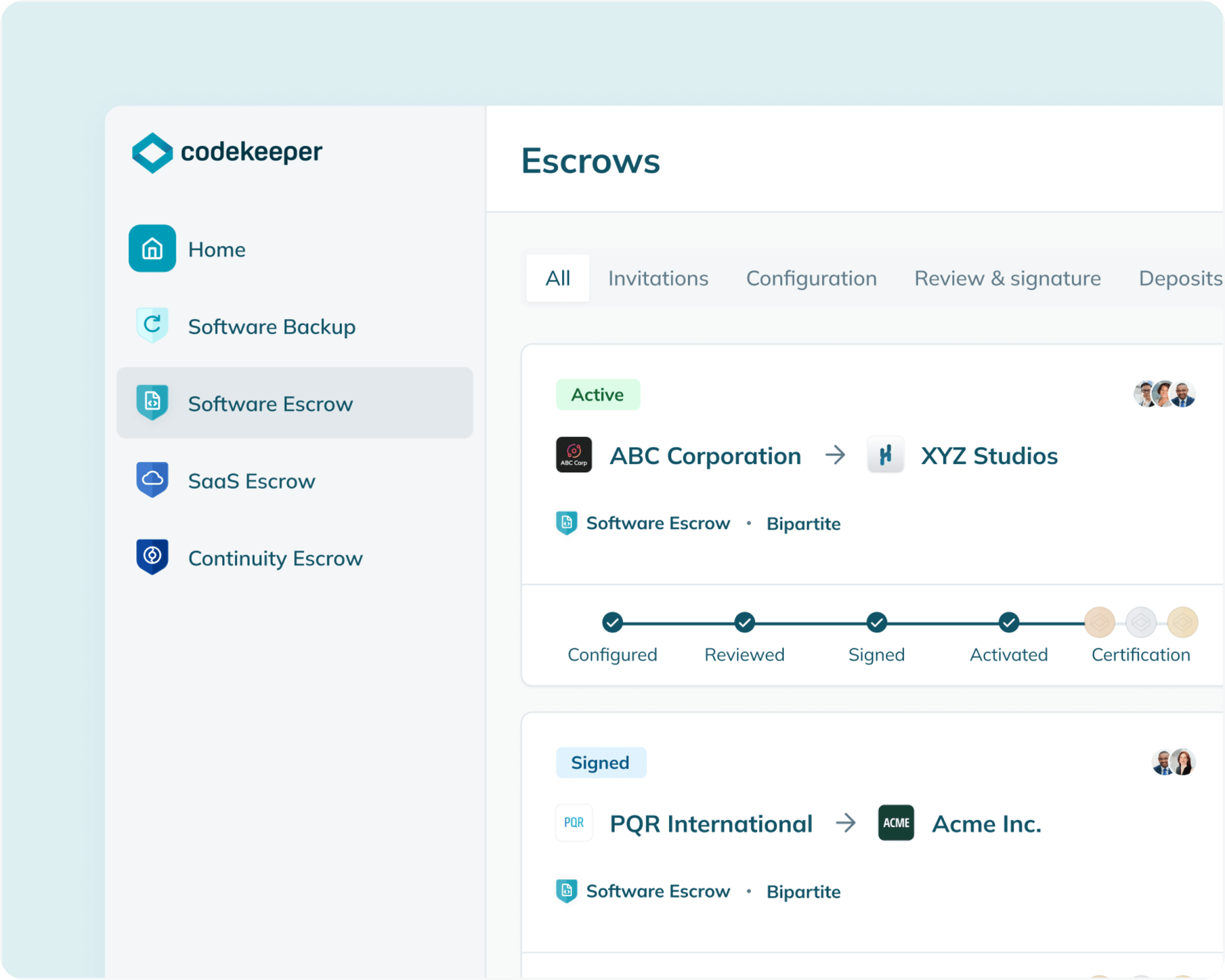
Some popular products many businesses depend on
Adyen
Prevent payment downtime by including Adyen as a third party in your Continuity Escrow.

Mailchimp
Keep your sales and marketing running by including Mailchimp as a third party in your Continuity Escrow.

Twilio
Keep your customers engaged by including Twilio as a third party in your Continuity Escrow.
Okta
Keep your company identities secured by including Okta as a third party in your Continuity Escrow.
Chargebee
Keep your subscriptions and billings manageable by including Chargebee as a third party in your Continuity Escrow.

Sendbird
Keep your chat and call features running by including Sendbird as a third party in your Continuity Escrow.

Shopify
Keep your online store running by including Shopify as a third party in your Continuity Escrow.

Stripe
Keep your payment processing running by including Stripe as a third party in your Continuity Escrow.
We can support all your third-party services to keep them running during a release situation.
Does depositing source code have to be this hard?
Time consuming manual deposits
Complex deposit procedures
Outdated and incomplete deposit versions
Missing, incorrect and wrong repositories deposited
Developers spending hours outside their workflows
Unsupported Source Code Management platform
Why people choose Codekeeper
Third-Party Dependencies Escrow
Developers love us!
Our platform is fully automated and directly integrated with the tools developers use every day to write source code. This eliminates the need to spend time on making manual deposits into escrows.
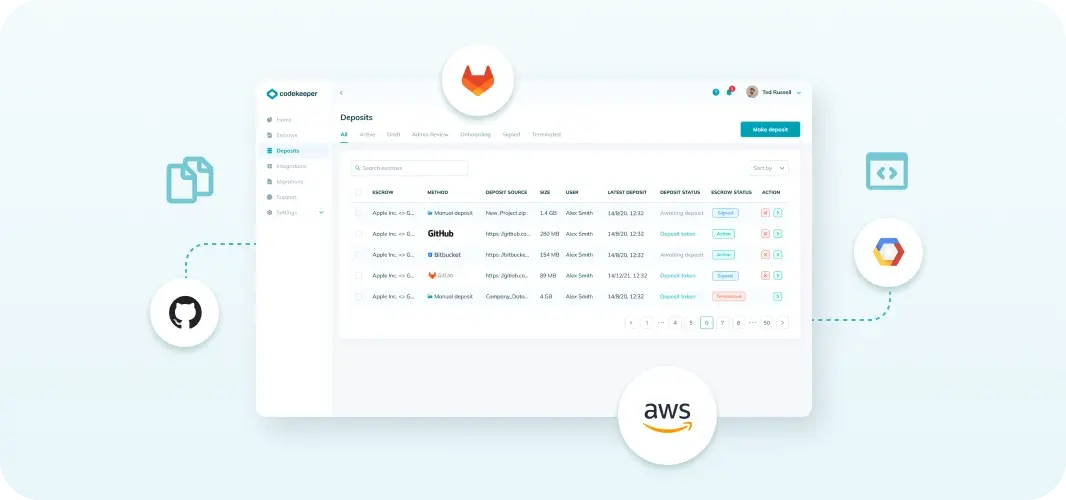
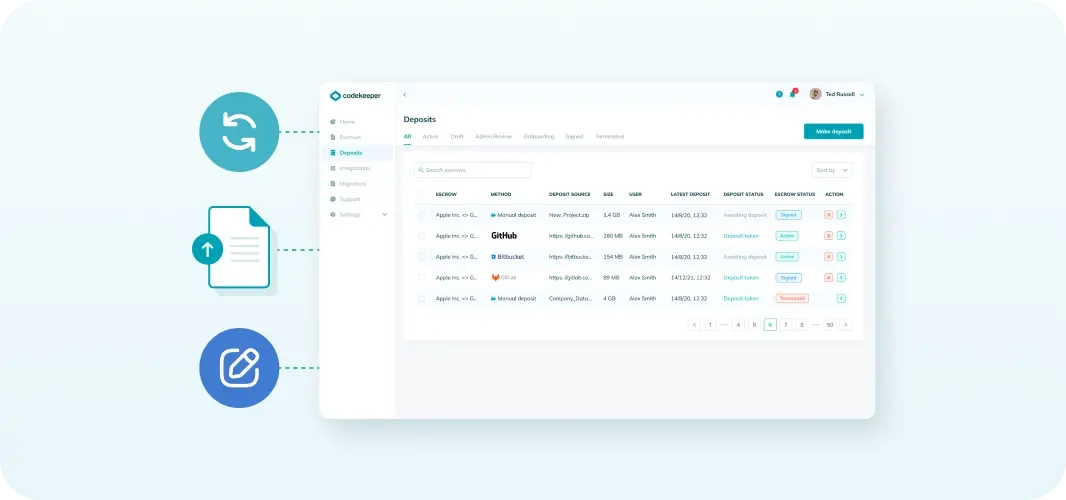
Easy deposit admin
No need to manage releases, versions and which repository belongs where. In our user interface you can easily add and manage your repositories.
Integrations library
Recent versions are always deposited within 24 hours, end-to-end encrypted (AES256) and fully automated. We support more than 50 integrations!


Many add-ons available
Need local storage? Or a Data Processing Agreement for GDPR/HIPAA? No problem! Have us verify and certify the deposits.
How it works
Setting up Third-Party Dependencies source code deposits for the escrow is a simple process. Codekeeper works directly with supporting third-party systems.
Integrate the platform of your choice
We support most commercially available environments with 50+ integrations available! See all integrations
For non OAuth integrations we provide a simple instruction to follow and configure yourself, if you need more assistance you can contact us.
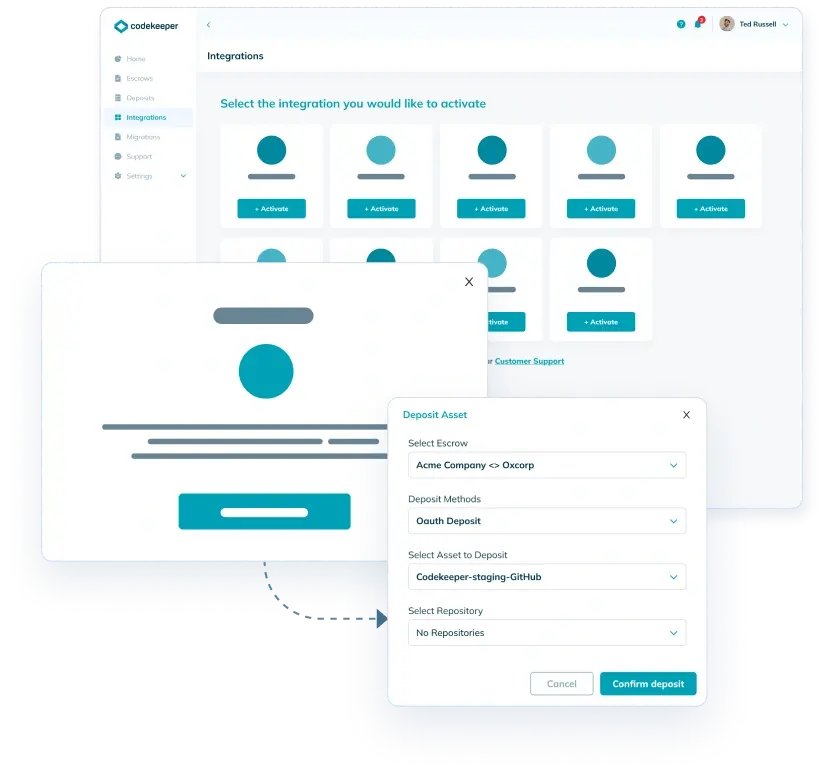
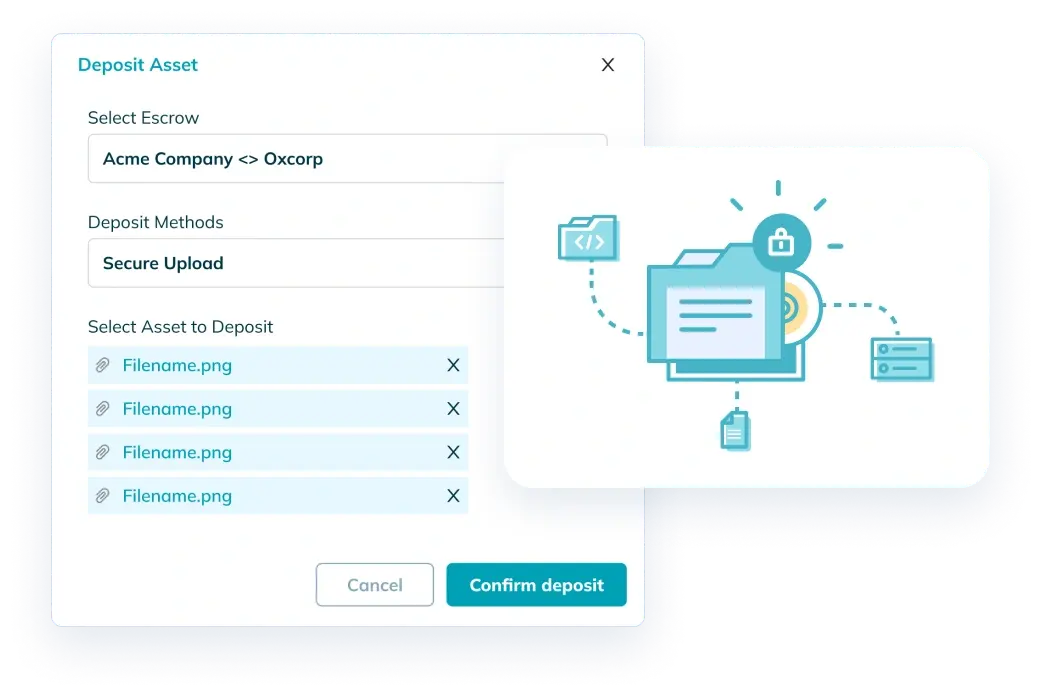
Or go manual and use our secure upload folder process
If you prefer manual upload, our upload folder system also provides you with a secure way to deposit your source code. Just upload your assets and we’ll do the rest!
Not covering your needs yet?
Our team is ready to provide you with assistance by discussing your needs and unique situations!

Industry-leading features at the best price
You don’t need to break the bank to protect your assets. At Codekeeper we provide you with unmatched security, scalability, and availability with your budget in mind. Let us know your current requirements, and we’ll send you a tailored offer.
Securely stored at the best data centers
We operate within the ISO27001 security framework. Our data center certifications:

ISO27001 data security
Our data centers adhere to the highest security standards and security policies. Security is always our first priority.
End-to-end encryption
Data is secured at all times, both in transit and at rest with AES256/512 encryption.
Deposit audit / logs
Review the deposit history on your account.
Secure upload folder
If you prefer manual upload, our upload folder system also provides you with a secure way to deposit your source code.
GDPR compliance (add-on)
If your deposits contain GDPR related data you will probably need a data processing agreement and related services.
HIPAA compliance (add-on)
If your deposits contain HIPAA related data you will probably need a data processing agreement and related services.
Continuity Escrow Assets
Other critical SaaS assets you can protect
Include the up and running applications into the escrow. Also include any third-party dependencies.
Hosting environment
Zero downtime by taking your entire hosting environment into Continuity Escrow. We support every on-premise & cloud hosting platforms!
Learn more
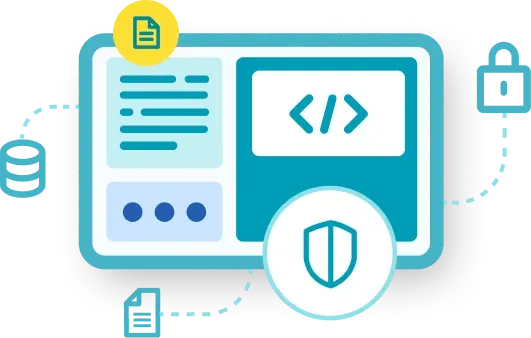
Ready for Continuity
Take your protection to the next level with Continuity Escrow
Demonstrate proper third-party risk management with:
Protected hosting environments
Secured supporting services
These companies already secured their software continuity. Will you start today?
Continuity escrow protects your business. It monitors vendor payments and maintains essential services to ensure continued access if a supplier fails to support or provide your critical software.
Best price guaranteed
No hidden costs
E-BOOK
Software Escrow 101
Fill in the form below to learn how software escrow helps you mitigate software risk and build strong cyber resilience.

**E-book available only in English
Get your free introduction to software escrow
Frequently asked questions
What is third-party dependency escrow?
Third-party dependency escrow involves placing libraries, frameworks, and other software components that a developer incorporates into their code to provide additional functionality in escrow with an escrow agent, like Codekeeper.
Why would I need a third-party dependency escrow?
A third-party dependency escrow can be useful in situations where businesses want to ensure that they have access to the necessary components to maintain their codebase in the event that a third-party component is no longer available or becomes incompatible.
What are the benefits of a third-party dependency escrow?
It provides businesses with peace of mind, knowing that they have access to the necessary components to maintain their codebase in the event of a disruption or compatibility issue. It can also help businesses to quickly resume operations without significant downtime.
How much does third-party dependency escrow cost?
Pricing starts from $149 per month. For more details, you can explore our pricing options here.
What are the supported integrations?
We support over 50 popular developer platforms and integrations. You can view the list of available integrations here.
How do I get started?
To get started with third-party dependency escrow, you can book a demo with one of our experts or directly explore our pricing options here.
What happens to my escrowed materials if Codekeeper goes out of business?
Codekeeper has contingency plans in place to ensure that your escrowed materials remain accessible even in the event that our business is no longer operational.
How secure are the stored assets?
We operate within the ISO27001 security framework and our data centers have multiple certifications to ensure the highest level of security. Deposited assets are encrypted using AES256, ensuring the safety and confidentiality of your software assets.
Can I transfer my existing escrow agreement to Codekeeper?
Absolutely! We are here to support your needs and will make sure your pre-existing agreement is up to date and implement any additional changes needed during the transfer stage.
Does Codekeeper have access to the content that’s deposited under escrow?
No. To ensure complete security and guarantee full integrity, the deposited materials are encrypted and stored in an automated process.
What are some examples release conditions?
Examples of release conditions may include the discontinuation of a third-party component, incompatibility issues, security vulnerabilities, change of ownership, or non-payment. The specific conditions will depend on the terms of the escrow agreement between the owner of the documents and Codekeeper.
What happens in the event of a release?
Once the release conditions are met, the necessary assets will be made available to the beneficiary.



